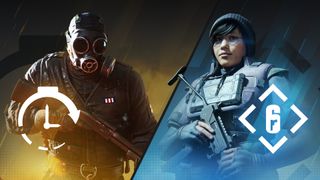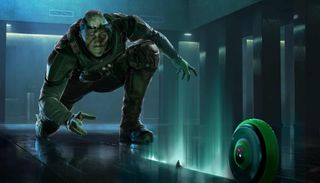Rainbow Six Siege keeps reinventing itself in ways other games are too scared to try
Eight years on, Siege has never been better.

Oh boy, I'm playing Rainbow Six Siege again. For four years I played almost daily, and then I burnt out. I've only picked up the game a few times since 2021, and phew, things sure are different. Loading up the main menu felt like going back home after four years of college. The walls are the same, but the furniture's all new and my old room is a gym.
Yes, things change in Siege in the same ways they do in lots of games—new maps, characters, and balancing tweaks shake up the meta, but the past few years of updates have demonstrated an impressive willingness from Ubisoft to break its own rules. The eight-year-old FPS has done some pretty radical stuff that challenges its traditions and makes Siege more tactically interesting.
Here's a big one: attackers can now repick their operators during the prep phase of every round, allowing them to discover which operators the other team is playing and change their lineup to counter it. If you'd asked 2017 me whether that was a good idea, I'd have probably laughed in your face. That's like if CS:GO let attackers rebuy guns halfway through the round, or if you could swap your entire Apex Legends lineup for the final fight. The ability favors attackers so heavily that many players were understandably worried it'd obliterate balance and create an environment where defenders can't do anything without getting countered.
The reality, at least in my experience, has been far less dramatic. If you're not in the top 10% of Siege players, attacking has always been harder than defending. Most Siege players match up with randoms who don't communicate, making it nearly impossible to coordinate operator picks to fit the situation. Attacker repick gives individual players more agency on the team to identify a need for the round (like a hard breacher, or an EMP-haver) and make the switch.
The whole operator pick phase just makes more sense now, too. The old way of guessing how the defenders were going to play and hoping you were right wasn't intuitive. Defenders, who can't repick, still have to play a guessing game with attackers, but Ubi has broken other unwritten rules to favor them. Back in my day, it was understood that defenders get SMGs and shotguns while attackers get the more powerful assault rifles and LMGs—lest balance be broken by a defender having a long-range gun.
The past few years of updates have demonstrated an impressive willingness from Ubisoft to break its own rules.
That didn't really happen either. Siege experimented with an LMG on defense way back in 2018, and has only gotten looser with weapon restrictions since then. Laser gate defender Aruni can use a DMR and Thunderbird has a straight-up assault rifle. Siege still does struggle with balancing firepower with defenders, but Ubi has gradually discovered that it has less to do with the guns, and more to do with scopes: give even the most useless defender a gun with magnification, and players will turn them into a formidable spawn peeker (looking at you, Warden).
Hard lessons
Another change I never expected to see is very small, but hugely meaningful. Ubi decided to nerf Siege's most distinct feature, its destruction, for the sake of balance. A few years ago, there was uptick in defenders making extremely small bullet holes in walls so that they could just barely see through, spot the vaguest hint of an enemy on the other side, and score easy kills. Some players argued the strategy was too easily abused, others said it was a clever use of destruction.
The biggest gaming news, reviews and hardware deals
Keep up to date with the most important stories and the best deals, as picked by the PC Gamer team.
Y6S2 brings several changes to Rainbow Six Siege including:Individual bullet holes no longer have a line of sight 🔍Which change are you most excited for? pic.twitter.com/1wlPI99HO6June 1, 2021
Ubi ultimately sided with the "overpowered" camp, and solved the issue with an almost invisible patch—now bullet holes up to a certain smallness have an opaque screen inside of them that you can only notice if you're really looking for it.
A few other new things I wasn't expecting to like so much going back to Siege:
- Hard breach secondary gadget: You no longer have to pick a dedicated hard breacher to do some hard breaching.
- EMP secondary gadget: An impact grenade that disables gadgets in a small radius. Finally, Thatcher isn't an insta-lock on attack.
- Observation blocker: A light projector that blocks vision only for drones and cameras, perfect against a team that's using their drones well.
- Gonne-6: An "Ash-in-a-can" launcher that replaces your pistol, but can destroy bulletproof gadgets
- Fuze: His explosive pucks can now pierce right through reinforced walls, making him infinitely more useful than he was for the first seven years of Siege
- Attachments: There are more scope types, and choosing a muzzle is now as simple as "do I want better recoil, to have a suppressed gun, or do a little extra damage." The old ones were confusing and wonkily balanced for years, and now they all have distinct uses.
- Shooting range: Siege has one now, and it's fantastic. Experiment with attachments, test gun damage, and compete in aim trials.
Ubi has spent years gradually chipping away at Siege's rough edges, both technical and in its design, and the work shows. The new scopes, laid back weapon restrictions, and an expanded secondary gadget pool have given Ubisoft more balance knobs to turn, and that's led to more interesting operators. Back when attackers either had claymores or frags and defenders either had C4s or barbed wire, deciding who got what felt arbitrary.

Ubisoft has spent years gradually chipping away at Siege's rough edges.
In the modern era of Siege, it's OK for an operator's unique gadget to be only sometimes useful, because they can usually bring lots of secondary utility. Intel-focused attackers like Zero can double as hard breachers in a pinch and roamers can watch their own back with bulletproof cameras. As a byproduct of more useful secondary gadgets, operators who can pick all-powerful C4s and frag grenades have become a more exclusive club, and more meaningful as a result.
The future of Siege
Not every big swing connects—I'd like a refund on Ubi's increasingly tacky taste in premium cosmetics, the odd map rework that's actually worse than the old one, and its truly awful battle pass experience—but many of its moves have come as a reaction to player behavior Ubi never planned for in 2015, and have ultimately made Siege more tactically interesting and balanced. It's no wonder Siege has become Ubisoft's most important game.
Look back at a Siege video from just a handful of years ago (like the one below) and it's incredible how unrecognizable it is. Remember when maps were so dark you could disappear into a dark corner, shields were a desync disaster, and client-sided debris and ragdolls could get you killed? I can't believe what we used to put up with.
Ubi isn't slowing down, either. Another one of those "couldn't believe it unless I saw it myself" radical changes is coming next season when "Quick Play 2.0" arrives, a rework of Siege's casual mode that will speed up the operator pick phase, round timer, and prep time. The most controversial aspect of the new Quick Play is pre-setups—to shorten the 45-second prep phase, casual maps will now come with pre-reinforced wall setups. Ubi says the setups will be useful and familiar to regular players, as they're based on the most statistically-common behavior on defense. Longtime players think the setups will make defense harder and less competitive.
At the same time that Ubi is making Quick Play less competitive, it's also turning Unranked into essentially a Quick Play replacement. Unranked will soon become "Standard." Ubi is getting rid of map and operator bans for Standard (good riddance) and shortening overtime to just one round. The result, Ubi hopes, will be a new and improved "default" mode that takes the best of Quick Play and Competitive into account.
Sounds like a gamble, but that's par for the course with Ubi. I used to think Siege's best days were behind it, and while it's still buggy and occasionally bewildering, it's in way better shape than when I played my first 1,500 hours. I wish my other favorite shooters showed the same tenacity to evolve, adjust, or just straight up delete old ideas in the name of a better game.

Morgan has been writing for PC Gamer since 2018, first as a freelancer and currently as a staff writer. He has also appeared on Polygon, Kotaku, Fanbyte, and PCGamesN. Before freelancing, he spent most of high school and all of college writing at small gaming sites that didn't pay him. He's very happy to have a real job now. Morgan is a beat writer following the latest and greatest shooters and the communities that play them. He also writes general news, reviews, features, the occasional guide, and bad jokes in Slack. Twist his arm, and he'll even write about a boring strategy game. Please don't, though.
Most Popular

